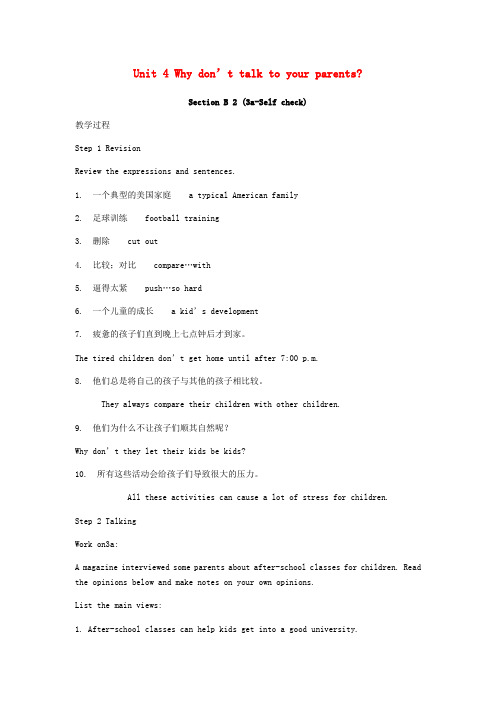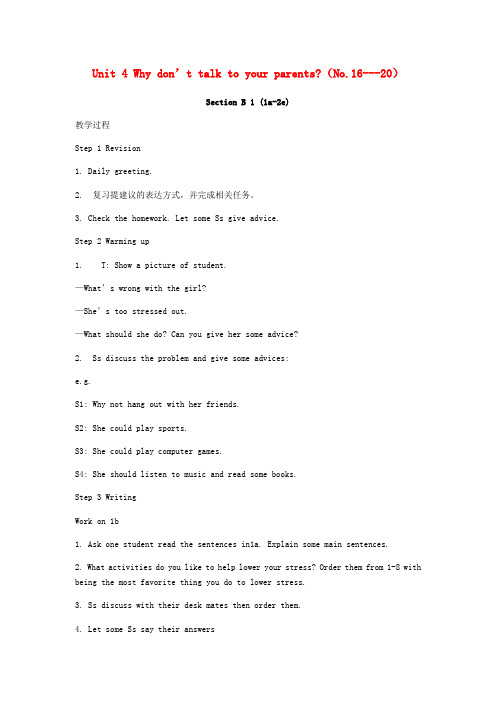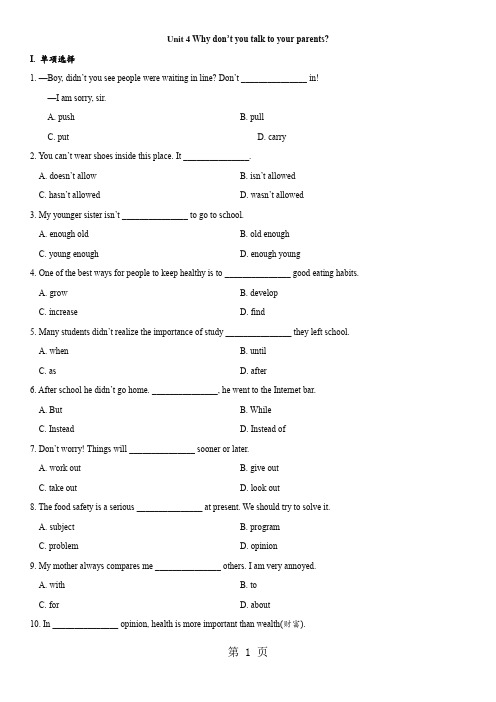2017_2018学年八年级英语下册Unit4Whydon'tyoutalktoyourparents重点知识归纳素材
- 格式:docx
- 大小:19.02 KB
- 文档页数:3

Unit 4 Why don’t talk to your parents?Section B 2 (3a-Self check)教学过程Step 1 RevisionReview the expressions and sentences.1. 一个典型的美国家庭 a typical American family2. 足球训练football training3. 删除cut out4. 比较;对比compare…with5. 逼得太紧push…so hard6. 一个儿童的成长 a kid’s development7. 疲惫的孩子们直到晚上七点钟后才到家。
The tired children don’t get home until after 7:00 p.m.8. 他们总是将自己的孩子与其他的孩子相比较。
They always compare their children with other children.9. 他们为什么不让孩子们顺其自然呢?Why don’t they let their kids be kids?10. 所有这些活动会给孩子们导致很大的压力。
All these activities can cause a lot of stress for children.Step 2 TalkingWork on3a:A magazine interviewed some parents about after-school classes for children. Read the opinions below and make notes on your own opinions.List the main views:1. After-school classes can help kids get into a good university.2. I want my child to be a successful person.3. It’s good for children to start learning from a young age.Ss talk with their partners about these views.Step 3 Asking and answering1. Ss say if they agree or disagree with the views above. Then give their reasons.2. Let some Ss say their reasons:S1: I disagree. Many factors may influence in one’s life. Even though one goes to a good university, he may still not be successful.S2: I agree. Many great people learn things from a very young age. If the child is gifted in some area, it’s helpful to learn it from a young age.S3: I disagree. People shouldn’t push their kids so hard. Parents shouldn’t send their small kids to all kinds of classes. They shouldn’t always compare their children with other children. I believe it’s better to let the kids be kids.3. Let some more Ss to tell their opinions.Step 4 WritingWork on 3b:1. Ask Ss what’s the common problem for Chinese and American families?Ss: They have to go to many after-school classes.2. OK. What’s your opinion about after-school classes? Now think about it and writea short article about to a magazine.写作指导:本文为写自己对课后辅导班的看法,故应为议论文。

Unit 4 Why don’t talk to your parents?(No.16---20)Section B 1 (1a-2e)教学过程Step 1 Revision1. Daily greeting.2. 复习提建议的表达方式,并完成相关任务。
3. Check the homework. Let some Ss give advice.Step 2 Warming up1. T: Show a picture of student.—What’s wrong with the girl?—She’s too stressed out.—What should she do? Can you give her some advice?2. Ss discuss the problem and give some advices:e.g.S1: Why not hang out with her friends.S2: She could play sports.S3: She could play computer games.S4: She should listen to music and read some books.Step 3 WritingWork on 1b1. Ask one student read the sentences in1a. Explain some main sentences.2. What activities do you like to help lower your stress? Order them from 1-8 with being the most favorite thing you do to lower stress.3. Ss discuss with their desk mates then order them.4. Let some Ss say their answersStep 4 TalkingLet some Ss talk about their answers.S1: I always hang out with my friends to lower stress.S2: I like to listen to music to lower stress best.Step 5 ListeningWork on1c:1. Tell Ss to read the sentences1cfirst.2. Play the recording for the Ss. Ss just listen for the first time. Play the recording again and check the problems Wei Ming talks about.3. Check the answers:Work on 1d:1. Let Ss read the sentences in 1d first. Tell Ss to listen again and fill in the blanks.2. Play the recording again for the Ss to listen and write.3. Ss listen to the recording carefully and try to write the words in the blanks.4. Check the answers with the class.Step 6 Pair work1. Work in pairs. Suppose your partner is Wei Ming. You try to tell her some advice and say why.2. Let two students make a model for the Ss.3. Ss practice their conversations4. Teacher can walk around the classroom, and give some help to the Ss.Step 7 Thinking1. T: There are some after-school activities. What activities do you and your classmates usually do? Check them.2. Ss check the activities they usually do.3. Ask some Ss say their choices.Step 8ReadingWarming upWhat did you do after school?Do you have stress in your life?How do you relax yourself?Fast Reading1. T: Now let’s work on 2b. First, let’s read the questions and make sure we know the meanings of all the questions. Then read the passage quickly and find the answers to the questions.1) What is the common problem for Chinese and American families?2) Who gives their opinions about the problems?2. Ss read the letter quickly and try to find the answers to the two questions.3. Check the answers with the class.Careful Reading1. T: Now let’s read these sentences about the letter. Read the passage again. Judge if the sentences are True or False. Please underline under the main sentences.1) Chinese children have to take so many after-school classes on weekends these days.2) Cathy Taylor really wants her three children to be successful, so she believes these after-school activities are important for them.3) Linda Miller thinks parents should send their small kids to all kinds of classes.4) Linda thinks some parents push their kids too much.5)Alice thinks kids shouldn’t have time to relax and think for themselves2. Ss read the letter again and judge the sentences.3. Check the answers with the class.Post readingWork on2c1. Now look at the words in bold in the article. Can you guess their meanings? Try to match them with the meaning below.2. Let Ss read and try to match the words.3. Give Ss some advice on how to do it.4. Check the answers with the Ss.5. Give some explanation about the difficult words.Work on 2d1. Tell Ss to read the passage again and answer these questions below.1) Does Cathy Taylor think it’s important for kids to join after school activities?2) Does Linda Miller agree with Cathy? What’s her opinion?3) Does Dr. Green agree with Cathy or Linda? What does she say?2. Ss work by themselves.3. Check the answers together.Homework1. Read the article again after school.2. Write a short passage about Cathy’s daily life and her opinions about the education of the kids.教后反思:。

Unit 4 Why don’t you talk to your parents?I. 单项选择1. —Boy, didn’t you see people were waiting in line? Don’t _______________ in!—I am sorry, sir.A. pushB. pullC. putD. carry2. You can’t wear shoes inside this place. It _______________.A. doesn’t allowB. isn’t allowedC. hasn’t allowedD. wasn’t allowed3. My younger sister isn’t _______________ to go to school.A. enough oldB. old enoughC. young enoughD. enough young4. One of the best ways for people to keep healthy is to _______________ good eating habits.A. growB. developC. increaseD. find5. Many students didn’t realize the importance of study _______________ they left school.A. whenB. untilC. asD. after6. After school he didn’t go home. _______________, he went to the Internet bar.A. ButB. WhileC. InsteadD. Instead of7. Don’t worry! Things will _______________ sooner or later.A. work outB. give outC. take outD. look out8. The food safety is a serious _______________ at present. We should try to solve it.A. subjectB. programC. problemD. opinion9. My mother always compares me _______________ others. I am very annoyed.A. withB. toC. forD. about10. In _______________ opinion, health is more important than wealth(财富).A. IB. meC. myD. mineII. 根据句意及首字母填入恰当的单词1. Sally is an honest girl. I believe w________ she says to us.2. You shouldn't c________ my homework. You should do it by yourself.3. She is always ready to help others, and she often o______ money to homeless people4. You can borrow this book from the library,but you must r__________ it on time.5. I am very busy. I have little time to c________ with my son.III. 用所给单词的正确形式填空1. I’m not going. Firstly I haven’t a ticket, and _______________ (second) I don’t like the play.2. When I came into the room, I found him _______________ (look) through my diary.3. _______________ (take) care of the patients is her job.4. If someone is in trouble, we should offer _______________ (help).5. A good educatio n is very important to children’s _______________ (develop).IV. 完成句子根据汉语意思完成英语句子,每空词数不限。



人教新目标版英语八下Unit 4《Why don’t you talk to your parents》说课稿一. 教材分析人教新目标版英语八下Unit 4主要讨论了如何与父母沟通的问题,通过本节课的学习,学生能够掌握一定的沟通技巧,提高与父母交流的能力。
本单元的主题贴近学生的生活,有利于激发学生的学习兴趣和积极性。
二. 学情分析根据我对学生的了解,他们在学习过程中已经掌握了基本的英语语法和词汇,具备一定的听说读写能力。
但部分学生在与父母沟通方面存在一定的困扰,可能因为害羞、害怕被批评等原因而不愿意与父母交流。
因此,本节课的教学目标在于帮助学生克服这些障碍,提高他们的沟通能力。
三. 说教学目标1.知识目标:学生能够掌握本节课的重点词汇和句型,如“Why don’tyou…?”,“Because…”等,并能够运用这些词汇和句型进行简单的交流。
2.能力目标:学生能够通过听力、口语、阅读和写作等多种方式,提高自己的英语应用能力。
3.情感目标:学生能够认识到与父母沟通的重要性,学会尊重和理解父母,提高与父母相处的质量。
四. 说教学重难点1.重点:本节课的重点是让学生掌握并运用句型“Why don’t you…?”和“Because…”进行交流。
2.难点:如何帮助学生克服害羞、害怕被批评等心理障碍,提高他们与父母沟通的勇气和信心。
五. 说教学方法与手段1.任务型教学法:通过设计各种真实的任务,让学生在完成任务的过程中运用所学知识,提高英语实际应用能力。
2.情境教学法:创设各种与父母沟通的情境,让学生在模拟实践中学会如何与父母交流。
3.小组合作学习:通过小组讨论、分享等方式,促进学生之间的互动,提高他们的合作能力和沟通能力。
六. 说教学过程1.导入:通过一个关于父子间沟通的小故事,引发学生对与父母沟通的思考,激发他们的学习兴趣。
2.呈现:介绍本节课的主题,展示相关的词汇和句型,让学生初步感知和学习。
3.实践:设计各种与父母沟通的情境,让学生在模拟实践中运用所学知识。
人教新目标八年级英语下册Unit 4 Why don’t you talk to your parents说课稿一. 教材分析人教新目标八年级英语下册Unit 4 Why don’t you talk to your parents是一篇关于日常交流和沟通的文章。
本篇文章主要讲述了在遇到问题时,如何与父母沟通,寻求解决方案。
通过本节课的学习,学生能够掌握情态动词why not的用法,以及如何运用交际策略进行日常交流。
教材内容贴近学生生活,有利于激发学生的学习兴趣和积极性。
二. 学情分析八年级的学生已经掌握了基本的英语语法和词汇,具备一定的听说读写能力。
但在实际交流中,学生往往因为害羞、紧张等原因不敢开口说英语,本题正好可以引导学生学会如何与父母沟通,提高他们的交际能力。
同时,学生在这个年龄段开始关注家庭和社交问题,对本节课的内容会产生浓厚兴趣。
三. 说教学目标1.知识目标:学生能够掌握情态动词why not的用法,了解日常交际中的沟通策略。
2.能力目标:学生能够运用所学知识进行日常交流,提高口语表达能力。
3.情感目标:学生学会与父母沟通,增进家庭关系,培养良好的交际习惯。
四. 说教学重难点1.重点:情态动词why not的用法和日常交际策略。
2.难点:如何运用所学知识进行实际交流,克服羞涩、紧张等心理障碍。
五. 说教学方法与手段1.情景教学法:通过设定情景,让学生在实际语境中学习英语,提高交际能力。
2.任务型教学法:学生分组完成任务,激发学习兴趣,培养合作精神。
3.互动式教学法:教师与学生互动,引导学生积极参与课堂讨论,提高口语表达能力。
六. 说教学过程1.导入:用一段关于家庭沟通的短片引出本节课的主题,激发学生的学习兴趣。
2.新课呈现:教师展示文章,引导学生关注文章标题和关键词,预测文章内容。
3.课堂讲解:教师讲解情态动词why not的用法和日常交际策略,让学生通过例句理解并掌握。
4.实践环节:学生分组进行角色扮演,运用所学知识进行实际交流,教师巡回指导。
2021-2021 学年度第二学期八年英Unit 4 Why don ’ t you talk to your parents(无答案〕1.I_____________ _____________ ______________ _____________ _____________ 〔不得不用功学〕soI_____________ _____________ ______________ _____________ 〔睡眠缺乏〕 .2.I_____________ _____________ ______________ ______________ 〔有太多的家庭作〕 so I __________________________ ______________ _____________ _____________ ______________ __________________________ ______________ _______________ 〔没有空做我喜的事〕 .3.My parents _____________ _____________ ______________ _____________ _____________ ___________________________ _____________ ______________ 〔不允我和朋友一起逛〕 .4.I_____________ _____________ ______________ _____________ _____________ 〔有太多的外班〕 .5.I_____________ _____________ ______________ _____________ _____________ ___________________________ _____________ 〔和我最好的朋友打架了〕 .6._____________ _____________ ______________/ _____________ _____________ ______________/_____________ _____________ 〔怎么了〕 ? I _____________ _____________ ______________ 〔真的很累〕because I_____________ _____________ ______________ _____________ _____________ 〔昨晚学到午夜〕 .7._____________ _____________ ______________ _____________ _____________ ___________________________ _____________ ______________ 〔什么今晚你不早点儿去睡呢〕?8.What’ sthe matter, Peter? I _____________ _____________ ______________ _____________ ___________________________ _______________ 〔和我最好的朋友打架了〕 .9._____________ _____________ ______________ _______________ 〔我怎么〕? Well, you_____________ _____________ ______________ _____________ _____________ ___________________________ _____________ ______________ ____________ 〔他打个,以便你可以声抱歉〕 .10.You _____________ _____________ 〔看上去很〕 , Kim. What ’ s wrong?11.Well, I _____________ _____________ ______________ _____________ ______________________________________ 〔我妹妹在翻我的西〕yesterday. She __________________________ ___________________________ _____________ ______________ _____________ _____________〔拿了我几本新志和几光〕.12.Hmm ⋯ _____________ _____________ ______________ _______________ 〔那不是很好〕 .13._____________ _____________ ______________ _____________ _____________ ______________ ________〔她把它你了〕? Yes, but _____________ _____________ _____________ ___________________________ _____________〔我是生她的气〕.14. What should I do? Well, I guess _____________ _____________ ________________________________________ ______________ ________________ 〔你可以叫她声抱歉〕.15.But _____________ _____________ ______________ _____________ _____________ ___________________________ _____________ ______________ _____________ _____________ ______________ ________ 〔什么不忘掉件事以便你能在做朋友呢〕?16.__________________________ ______________, _____________ _____________ ________________________________________ 〔尽管她不,但它不是什么大不了的事〕.17.You’ re right._____________ ______________ ______________ 〔你的建〕 . No problem.__________________________ ______________ _____________ 〔希望事情会好起来〕 .18.My problem is I_____________ _____________ ______________ _____________ ___________________________〔不能和我的家人和睦相〕 .19._____________ _____________ ______________ _____________ _____________ ______________〔我父母之的关系已得不易相〕. They _____________ _____________ ______________〔常吵架〕 , and I really don ’ t like it.20._____________ _____________ ______________ _____________ _____________ ______________〔是他有的唯一沟通〕. I don’t know _____________ _____________ ______________ _____________ _____________ ______________ _____________ _____________ ______________ 〔我是否就件事他点什么〕 .1 / 41 / 42021-2021 学年度第二学期八年级英语Unit 4 Why don’ t you talk to your parents词组练习 (无答案〕21._____________ _____________ ______________, _____________ _____________ ________________________ ,_____________ _____________ ______________ _____________ _____________ ______________〔当他们争吵的时候,就像一大块乌云悬在我们家的上方〕.22.Also, my elder brother is not very nice to me. He always_____________ _____________ ___________________________ _____________ ______________ _____________ _____________ ______________ 〔拒绝让我看我喜欢的电视节目〕 .23._____________ _____________ ______________ _____________ _____________ ____________________________ _____________ _____________ ______________ 〔相反,晚上无论他想看什么就看到很晚,我认为这不公平〕 .24._____________ _____________ ______________ _____________ _____________ ___________________________ _____________ . _____________ _____________ ______________? 〔在家里我总是觉得孤独和焦虑。
Unit 4 Why don't you talk to your parents?◆必记单词1.allow v. 允许;准许高频2.wrong adj. 有毛病的;错误的3.guess v. 猜测;估计4.deal n. 协议;交易5.relation n. 关系;联系;交往→relate v. 与……有联系6.communication n. 交流;沟通7.argue v. 争吵;争论8.cloud n. 云;云朵→cloudy adj. 多云的9.elder adj. 年纪较长的→older adj. 年长的10.instead adv. 代替;反而;却高频11.whatever pron. 任何;每一→what pron. 什么12.nervous adj. 焦虑的;担忧的→nervousness n. 紧张感13.offer v. 主动提出;自愿给予高频n. 提议;出价14.proper adj. 正确的;恰当的→properly adv. 合适地15.secondly adv. 第二;其次→second num. 第二16.communicate v. 交流;沟通17.explain v. 解释;说明→explanation n. 解释;说明18.clear adj. 清楚易懂的;晴朗的→clearly adv. 清晰地19.copy v. 抄袭;模仿;复制;复印n. 份;副本20.return v. 归还;回来;返回21.anymore adv. (常用于否定句和疑问句末)再也(不);(不)再高频22.member n. 成员;分子→membership n. 成员资格23.pressure n. 压力→press v. 按;压24.compete v. 竞争;对抗→competition n. 竞争;对抗→competitor n. 竞争者;对手25.opinion n. 意见;想法;看法高频26.skill n. 技艺;技巧→skilled adj. 技艺娴熟的27.typical adj. 典型的28.football n. (美式)橄榄球;足球29.quick adj. 快的;迅速的;时间短暂的高频→quickly adv. 快速地→slow adj. 缓慢的(反义词)30.continue v. 持续;继续存在31.compare v. 比较高频32.crazy adj. 不理智的;疯狂的→mad adj. 疯狂的33.push v. 鞭策;督促;推动→pull v. 拉34.development n. 发展;发育;成长→develop v. 发展35.cause v. 造成;引起36.usual adj. 通常的;寻常的高频→usually adv. 通常→unusual adj. 不平常的(反义词) 37.perhaps adv. 可能;大概;也许◆重点短语1.allow sb. to do sth. 允许某人做某事高频【拓展】let sb. do sth.让某人做某事2.call up 打电话3.have a fight with 与……打架/争吵【拓展】fight with sb.与……打架4.look through 快速查看;浏览高频【拓展】look out 小心look for 寻找look after 照看look like 看起来像look up 查阅5.big deal 重要的事6.work out 成功地发展;解决7.get on with 和睦相处;关系良好高频【拓展】get along with 与……相处8.refuse to do sth. 拒绝做某事高频9.communicate with 与……交流高频10.compare...with... 比较;对比高频【拓展】compare...to...把……比作……11.not...anymore 不再【拓展】not...any longer 不再no longer 不再12.worry about 担心高频【拓展】be worried about 担心13.cut out 删除;删去【拓展】cut off 切断cut down 砍倒;削减cut up 切碎14.be good for 对……有好处高频【拓展】be good to 对……有好处do harm to 对……有害be harmful to 对……有害15.think of 想到16.in one's opinion 依……看高频◆重点句子1.I have too much homework so I don't have any free time to do things I like.我有太多的家庭作业,所以我没有任何空闲时间做我喜欢的事。
Unit 4 重点知识归纳
重点单词
名词
1. 关系 __________
2. 交流;沟通 __________
3. 成员 __________
4. 压力 __________
5. 意见;看法 __________
6. 技艺;技巧 __________
7. 发展;发育 __________
动词
8. allow __________
9. guess __________
10. argue __________
11. offer __________
12. communicate __________
13. explain __________
14. copy __________
15. return __________
16. compete __________
17. continue __________
18. push __________
形容词
19. 有毛病的;错误的__________
20. 年纪较长的 __________
21. 焦虑的;担忧的 __________
22. 清楚易懂的 __________
23. 典型的 __________
24. 不理智的;疯狂的 __________
重点短语
25. work out __________
26. cut out __________
27. compare ... with ... __________
28. have a fight with sb. __________
29. give (sth.) back __________
30. get on with __________
31. look through __________
32. in one’s opinion __________
重点句子
33. 你为什么不和她说对不起呢?
_________________________
34. 你应该忘记那件事以便你们还能成为朋友。
_________________________
35. 尽管他错了,但也不是什么大事。
_________________________
答案
1. relation
2. communication
3. member
4. pressure
5. opinion
6. skill
7. development
8. 允许
9. 猜测;估计 10. 争吵;争论
11. 主动提出;自愿给予 12. 交流;沟通
13. 解释;说明 14. 复制;复印 15. 归还;返回16. 竞争;对抗 17. 持续;继续存在
18. 鞭策;督促;推动 19. wrong 20. elder
21. nervous 22. clear 23. typical 24. crazy 25. 成功地发展;解决 26. 删除;删去
27. 把……与……作比较 28. 和某人打架
29. 归还(某物) 30. 和睦相处
31. 快速查看;浏览 32. 依……看
33. Why not / Why don’t you say sorry to her?
34. You should forget about it so that you can be friends again.
35. Although he is wrong, it’s not a big deal.。